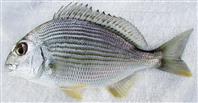In Irish folklore, the salmon is the fish of wisdom. When the young warrior Fionn cooked a salmon he had caught, a drop of the fish oil fell onto his thumb and the moment he put it into his mouth, he became the wisest man in Ireland. There are many types of salmon, including a few that are born in fresh water, and migrate to the ocean to grow up, before returning to their birthplace during reproduction—legendary for being equally at home in fresh and salt water.
Prof. Norman Y.S. Woo of the School of Life Sciences said despite detailed research on salmon, scientists still don’t have a persuasive answer to the question of why they return to reproduce in fresh water. He added, ‘Some types of eel also do the same but in reverse: they live in fresh water and return to the sea to have babies.’
Salmons and eels inspired Professor Woo to wonder about the effects of seawater’s salinity on fish. In other words, can sea fish be kept in fresh water? He explained that sodium constitutes about 3.5% of seawater and close to 0% of fresh water. Vetebrates have bodily fluids containing 1% sodium, which means they have a third of the salinity of seawater. When the latter’s salinity rises above average levels, it triggers a mechanism in fish’s bodies which enables them to get rid of the excess sodium while taking in more water. ‘When the salinity level is too high, fish become dehydrated. When we preserve tangerines with salt, the tangerines lose water by the same logic. Fish living in an overly salty environment need to replenish water just like humans in a desert.’
On the other hand, salt water fish living in low-salinity water will compensate for the loss of sodium while getting rid of excess water. And it is chemicals which trigger this mechanism. When the fish feel the change in salinity, their gills, kidneys and some other organs will make osmotic adjustments. These chemicals behave like hormones in humans. Generally speaking, fish use a third of their total energy to work this mechanism, so theoretically they survive best in brackish water, because it does away with the need to remove or replenish sodium. They can then channel the energy into other uses, most significantly turning food into protein, which results in faster growth and a stronger immune system.
Professor Woo observes that all seawater fish have both of these osmotic adjustment functions though one is almost never used. Take coral fish for instance. Spending all their lives in high-salinity environments renders their sodium-replenish function idle, and by the theory of evolution, degenerate and disappear. According to Professor Woo’s deductions, the most plausible explanation is that osmotic specialization began in the Devonian Period some 300 million years ago. Seawater then was a lot less salty than it is now, so fish were able to adjust to living in fresh water. Through the ages, as the oceans’ salinity rose, sea fish developed another function which allows them to get rid of excess sodium, alongside the function they inherited from their ancestors.
Professor Woo has awakened this function in sea fish that had been latent for tens of millions of years. He used sea bream in his study because it is available in large numbers locally and it’s hardy. He has completely mastered the technology of keeping salt water fish in fresh water. Does it have great potential for development and what is its commercial value? ‘I never thought of that. Commercial fish farming is a totally different matter. Salt water fish raised in fresh water tend to have a milder flavour, which may not appeal as much to Hong Kongers as real sea fish. But our aim is scientific research. We use different ways to think and observe, and uncover the mysteries of evolution. That is a biologist’s greatest pleasure.’ 



































































































































































Social Bookmarks